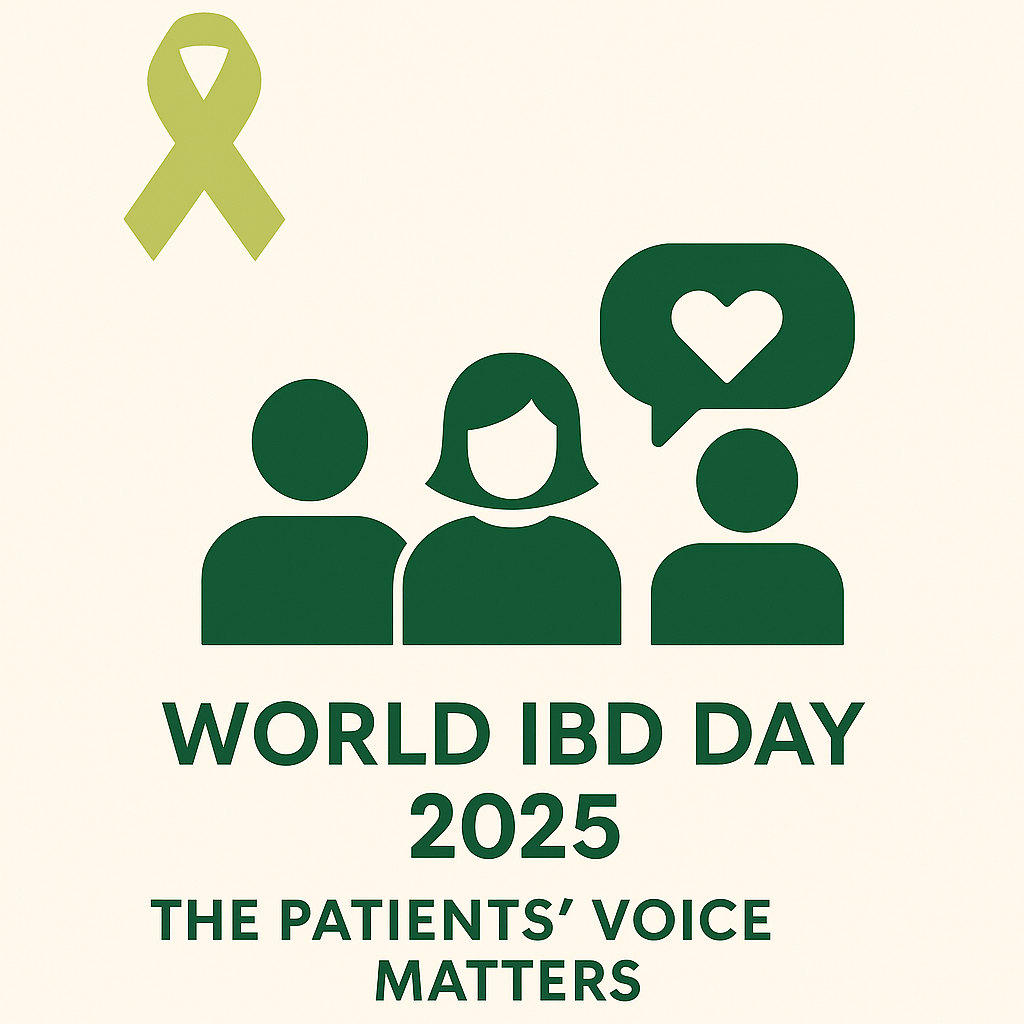Health Through Evidence (HTE) for World Inflammatory Bowel Disease Day 2025
by Marina Psarra, MSc, Biologist-Medical writer.
Inflammatory Bowel Disease (IBD), encompassing Crohn’s disease and ulcerative colitis, continues to impose a significant burden on individuals worldwide. Although treatment options have expanded in recent years, the day-to-day experience of living with IBD remains complex and often challenging. Symptoms such as chronic pain, fatigue, and gastrointestinal distress frequently persist even during periods of clinical remission, adversely affecting mental health, work productivity, and social interactions. Importantly, what patients report about their own health often tells a different story than what clinical indicators alone can reveal. As awareness grows globally around World IBD Day, Health Through Evidence (HTE) presents new findings that elevate the patient perspective and underline the need for a more holistic and responsive approach to care.
Between October 2023 and January 2024, HTE conducted a cross-sectional survey in collaboration with the Hellenic Society of Crohn’s Disease and Ulcerative Colitis Patients (HELLESCC). The study included 287 individuals living with IBD in Greece—201 with Crohn’s disease and 86 with ulcerative colitis—all of whom were receiving biologic therapy at the time of participation. Despite the use of advanced therapies, the survey revealed that many patients continue to face a substantial and multifaceted burden in their daily lives.
In patient group with Crohn’s disease, 43% were in clinical remission, 25% had mild disease, and 31% experience moderate to severe symptoms. For 76% of patients, quality of life was significantly impacted and for more than half (N=145) moderate to severe depressive symptoms were present. In addition, one-fifth reported work productivity loss, while 30% find even basic daily activities difficult. Interestingly, 42% of patients were dissatisfied with their current therapy, naming persistent fatigue as the top reason [1].
In like manner, among patients with ulcerative colitis, fewer than half (42%) of patients were in clinical remission, 30% had mild disease, and 28% had moderate to severe disease. Beyond clinical symptoms, nearly three in four patients reported a moderate to severely impaired quality of life and more than half (N=67) showed signs of depression. Further, a third of patients reported difficulty performing basic everyday activities and around 10% experienced limited work productivity. Frequent flares were the leading cause of dissatisfaction, with one in three patients remaining unhappy with their current treatment [2] .
The findings reveal a remarkably consistent pattern across both Crohn’s disease and ulcerative colitis. Irrespective of disease type, patients reported similarly high levels of disease burden and unmet needs [3]. Rates of impaired quality of life, depression, loss of productivity, difficulty with daily activities, and treatment dissatisfaction were nearly identical in both patient groups, indicating a shared underlying burden.. Τhis comes in alignment with previous studies (Williet 2017 & Cross 2022) [4, 5]. Of note, most patients (89%) remained adherent to treatment, yet nearly 4 in 10 expressed dissatisfaction often linked to ongoing symptoms such as fatigue and ongoing flare-ups [3]. These findings suggest that dissatisfaction may not be a consequence of poor adherence, but rather a reflection of persistent unmet therapeutic needs.
Moreover, the study explored patients’ treatment preferences, further highlighting the need for a personalized, patient-centered approach to care. Across both Crohn’s disease and ulcerative colitis, long-term disease control emerged as the cornerstone of meaningful treatment. Sustained remission over a two-year period was ranked as the most crucial attribute, followed by one-year remission rates, mucosal healing, and time to symptom relief. While safety was also a consideration, it was secondary to efficacy in both patient groups. When it came to the mode of administration, notable differences emerged between the two groups. Ulcerative colitis patients showed a clear preference for oral therapies, while Crohn’s disease patients favored subcutaneous options. It should be noted the lack of available oral advanced therapies for Crohn’s disease in Greece during the study period might have influenced patients’ responses. Interestingly, in both groups, patients consistently preferred treatment options that required less frequent dosing and longer intervals between administrations.
The study clearly underscores the importance of incorporating the patient voice in the management of IBD. Patient-Reported Outcomes (PROs) offer a vital, often overlooked perspective that goes beyond clinical assessments, capturing the lived reality of those affected by the disease. Through self-reported experiences, patients highlight critical aspects such as quality of life, emotional well-being, functional capacity, and satisfaction with treatment. These insights are essential not only for understanding the true burden of IBD, but also for guiding physicians and policymakers toward more patient-centered, responsive care strategies.
In light of these findings, effective IBD management should go beyond symptom control and clinical markers. It must listen to and reflect the lived experiences, needs, and preferences of patients themselves. As healthcare systems and therapeutic options evolve, integrating PROs and individual treatment preferences into routine care is not just beneficial—it is essential for delivering care that is truly patient-centered, sustainable and impactful.
References
- Tzanetakos, C., et al., PCR146 Disease Burden and Unmet Medical Need in Patients With Crohn’s Disease in Greece: A Cross-Sectional Patient Survey. Value in Health, 2024. 27(12, Supplement): p. S534.
- Gourzoulidis, G., et al., PT42 Disease Burden and Unmet Medical Need in Patients With Ulcerative Colitis in Greece: A Cross-Sectional Patient Survey. Value in Health, 2024. 27(12, Supplement): p. S639.
- Tzanetakos, C., et al., P0268 Patient-reported outcomes in a Greek cross-sectional survey of inflammatory bowel disease patients treated with biologic therapy. Journal of Crohn’s and Colitis, 2025. 19(Supplement_1): p. i703-i703.
- Williet, N., et al., Patient-reported Outcomes in a French Nationwide Survey of Inflammatory Bowel Disease Patients. J Crohns Colitis, 2017. 11(2): p. 165-174.
- Cross, R.K., et al., Poor Patient-Reported Outcomes and Impaired Work Productivity in Patients With Inflammatory Bowel Disease in Remission. Gastro Hep Adv, 2022. 1(6): p. 927-935.
